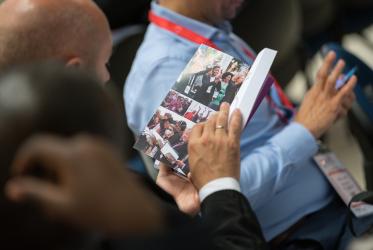Dear sisters and brothers in Christ!
Moderator,
Delegates and all who participate in this WCC Assembly,
and I want to particularly acknowledge the presence of all of you who do not carry a title among those listed in the greetings like these.
Dear sisters and brothers! The next assembly will be in 2030. Our sustainability goals should be reached by then. And we should not be those who are cynical and say we won’t make it. Are we not people of faith?
It is a miracle that we all are able to gather here. Knowing how much work it is behind such an event, I will particularly commend all staff members and all involved in the preparations in so many ways that we are here. I also honour the leadership, the acting general secretary, and the governing bodies of the WCC, for the enormous efforts to make the council able to handle and even develop the work under all the challenges caused by the COVID-19 pandemic – in addition to the last part of these preparations. We duly remember the work of the late Metropolitan Gennadios of Sassima, the vice moderator of the central committee, one of the pillars in the ecumenical movement.
Christ’s love moves the world to reconciliation and unity. We meet in a time of history where it is absolutely necessary that the churches together say exactly so. Even more important is that we show that we believe it, and show what it means and could mean in times like these.
The world is already deeply into challenges that humanity has not seen before, through the climate changes and all its effects and to the whole world. As always, first and mostly affected are those who already are the most vulnerable. The issues of justice and peace are raising every day before us.
Reconciliation and unity are more needed than ever; and what we see is a world more and more divided by the many forces of politics, economy, climate changes, pandemics, wars, and other causes of injustice and conflict.
This is not the time to declare the word “unity” as obsolete, but to take ownership of it and show what it means—in the love of Christ to all—and really: all. Who are we to exclude somebody from that, as a gift, as a right to protection, a right to peace and justice—and as an ability to love?
My first speech to a WCC body was in the big hall in the ecumenical centre in Geneva, addressing the central committee. I pointed to the huge tapestry there and its text: “hina pantes hein åsin” (“That they all may be one”). The quest for being one in the fellowship of churches is the origin and the goal of our work. Many efforts have been made and many fruits harvested. We see them as we are here together, if we open our eyes to see.
We, the churches, need a global ecumenical fellowship of churches leading us in confessing and repenting from our sins, leading us in transformation from the destructions, obstacles and ignorance of the full meaning of being one. We are called to be one as churches, as followers of Christ.
Therefore, not in addition, to be one as church must be also a sign and expression of God’s one humanity in God’s one creation. Deeper reflection of what it means is needed, particularly in taking seriously that all, really all, are embraced and can express the love of God. We do so also in this assembly.
However, often, maybe most often, it is clear enough for us what it means. We can know if we are mutually accountable in our encounter, if we are honest and put clear names on the realities we have to share and address together. Then we do not ignore the call from God to be our brother and sister’s keeper, to love our neighbour as ourselves, to be peacemakers, to show real compassion, to end occupation, violence and wars, to pray and work for the impact of Christ’s love in this world.
This assembly should help the churches in the world to be courageous and clear about how we can contribute together – together – being one creation and one humanity in the next eight years. If we cannot show what it means that Christ’s love moves the world to reconciliation and unity, God must call others.
It is our privileged position in this assembly to acknowledge, receive, celebrate – but more important: to make use of the fruits of the work of the whole WCC in the years since the 10th assembly in 2013. These are costly gifts, given as fruits of hard and difficult discussions and new initiatives, and they can now be used as a platform on which the next years of work can stand and move on. All could be mentioned. I mention only the whole new approach and methodology developed in the Pilgrimage of Justice and Peace.
I congratulate the elected general secretary, Jerry Pillay, and I assure him and those who will be elected to carry on these responsibilities in the coming period of the prayers of and support of my church and of myself.
I am particularly encouraged by the participation, but even more the input and impact of the wisdom of young people in this assembly, like we had in the plenary this morning. This is very promising for the WCC. More important: it is necessary for the work and contribution we shall do together. You are not only the future of the church and the ecumenical movement, you are the present as well as anybody else, and even have a special insights and clarity about what is at stake in times ahead of us.
May Christ’s love move us all!
Most Rev Dr Olav Fykse Tveit





